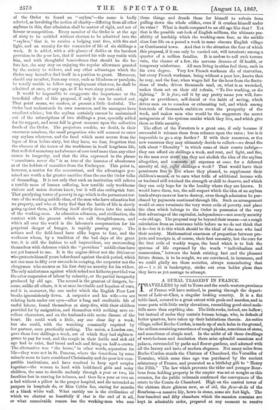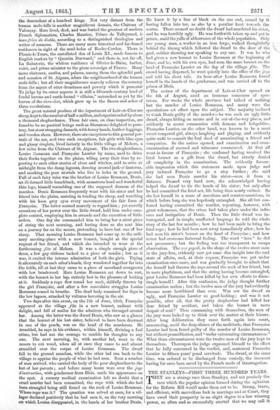A RURAL TRAGEDY IN FRANCE.
TRAVELLERS by rail to Tours and the south-western provinces
of France will have noticed, in passing through the depart- ment of Loir-et-Cher, a singular looking country. It is a flat table-land, covered to a great extent with pools and marshes, and in some parts with little rocky elevations, resembling good-sized mole- hills more than anything else. The little rocks, indeed, are hollow; but instead of moles they contain human beings, who, in default of better quarters, have taken up. their habitations therein. An entire village, called Roche-Cordon, is made up of such holes in the ground, the orifices consisting sometimes of rough planks, sometimes of stone, and sometimes of simple mud. In the midst of all these dwellings of wretchedness and desolation there arise splendid mansions and palaces, surrounded by parks and flower-gardens, and adorned with all the luxury and taste of modern elegance. Not many miles from Roche-Cordon stands the Chateau of Chambord, the Versailles of Touraine, which some time ago was purchased by the ancient aristocracy of France, and presented as a birthday gift to "Henry the Fifth." The law which prevents the tlder and younger Bour- bons from holding property in the empire was set at nought on this occasion, for the public tribunals confirmed the conveyance of the estate to the Comte de Chambord. High on the central tower of the chateau there glistens now, as of old, the fleur-de-lis of the Bourbons—a massive lily, hewn in stone, some six feet high. The four hundred and fifty chambers which the mansion contains are kept in admirable order, prepared at any moment to receive the descendant of a hundred kings. Not very distant from the human mole-hills is another magnificent domain, the Chateau of Velencay. Here lived, died, and was buried the greatest of modern French diplomatists, Charles Maurice, Prince de Talleyrand, is beau-frere du diabk, according to a distinguished theologian and writer of sermons. There are many more historical and far-famed residences in sight of the mud-holes of Roche-Cordon. There is Plessis-le-Tours, the castellated den of Louis XL, made famous to English readers by " Quentin Durward;" and there is, not far off, La Rabaterie, the whilom residence of Olivier-le-Daim, barber, valet, and prime minister to the pious sovereign of France. Many more chateaux, castles, and palaces, among them the splendid park and mansion of St. Aignan, adorn the neighbourhood of the human mole-hills ; but all their magnificence scarcely relieves the country from the aspect of utter dreariness and poverty which it presents! To judge by its outer aspects it is still a fifteenth-century land of feudal barons and earth-bound "villains," untouched as yet by the leaven of the tiers-itat, which grew up in the flames and ashes of three revolutions.
The great natural produce of the department of Loir-et-Cher are sheep, kept to the number of half a million, andsuperintended by about -a thousand shepherdesses. There fair ones, on close inspection, are found to be no poetical beings such as Shenstone delighted to pour- tray, but stout strapping damsels, with horny hands, leather-leggings, and wooden shoes. However, there are exceptions to this general por- trait of the sex, and two such exceptions, fair girls with blue eyes and glossy ringlets, lived latterly in the little village of Mehers, a few miles from the Chateau of St. Aignan. The two shepherdesses, Louise Rousseau and Franeoise Laurier by name, used to drive their flocks together on the plains, wiling away their time by re- peating to each other stories of elves and witches, said to arise at midnight from the damp lagoons, dancing around jack-o'-lanterns, and mocking the poor mortals who live in holes in the ground. Full of such fairy tales was the brother of Louise Rousseau, Denis, an ill-formed little hunchback, with monstrous head and wonderful thin legs, himself resembling one of the supposed demons of the marshes. Denis Rousseau frequently went with his sister and her friend into the plains, assisting in tending the sheep, and watching with his keen grey eyes every movement of the fair form of Franceise. The latter seemed scarcely to regard him ; yet secretly conscious of her power over the little dwarf, held him under com- plete control, employing him in errands and the execution of little orders. One day she commanded him to bring her a stout piece of string the next morning, and having done so she sent him on a journey far on the moors, pretending to have lost one of her sheep. That morning Louise Rousseau had come up to the ordi- nary meeting-place with a new bonnet, bought at the special request of her friend, and which she intended to wear at the forthcoming fits of Mehers. It was a simple enough piece of dress, a few gay ribbons tacked to a piece of muslin ; but as it was, it excited the intense admiration of both the girls. Trying it alternately on each other's heads, they wandered together far into the fields, till at last they came to a piece of moorland overgrown with low brushwood. Here Louise Rousseau sat down to rest, with the bonnet in her lap, entirely lost in the pleasure of looking at it. Suddenly a rope flew round her neck, skilfully thrown by the girl Francoise, and after a few convulsive struggles Louise Rousseau ceased to breathe. The dead body remained for days in the low lagoon, attacked by vultures hovering in the air.
Two days after this event, on the 7th of June, 1860, Francoise appeared at the village fete in a new bonnet, radiant with delight, and full of smiles for the admirers who thronged around her. Among the latter was the dwarf Denis, who saw at a glance that the bonnet of his lost sister, believed to have been drowned in one of the ponds, was on the head of the murderess. He trembled, he says in his evidence, within himself, divining a foul crime, but had not the courage to confide his thoughts to any one. The next morning, he, with another lad, went to the moors to cut wood, when all at once they came to and almost stumbled over the corpse of Louise Rousseau. The dwarf fell to the ground senseless, while the other lad ran back to the village to apprise the people of what he had seen. Soon a number of men arrived, who carried the body of the poor shepherdess to the hut of her parents ; and before many hours were over the juge &instruction, with gendarmes from Blois, made his appearance on the spot. A cursory medical examination left no doubt that a cruel murder had been committed, the rope with which she had been strangled being still found on the neck of Louise Rousseau. Whose rope was it ? The question was solved at once, for a vil- lager declared positively that he had seen it, on the very morning on which Louisa disappeared, in the hands of her brother Denis. He knew it by a line of black on the one end, caused by it having fallen into tar, as also by a peculiar knot towards the centre. There seemed no doubt the dwarf had murdered his sister, and he was horribly ugly. He was forthwith taken up and put in prison, amid the yells of abhorrence of the whole population. Only one young man, a worker in an iron forge, walked thoughtfully behind the throng which followed the dwarf to the door of the gaol, neither shouting nor speaking to any one. It was he who had given a new bonnet to Louise Rousseau at the beginning of June, and he, with his own eyes, had seen the same bonnet on the head of Francoise Laurier on the day of the village fete. The crowd having dispersed, he went quietly into the office of the jugs and told his short tale. An hour after Louise Rousseau found herself in the hands of the gendarmes, and was carried off to the prison of Blois.
The assizes of the department of Loir-et-Cher opened on the 4th of August, amid an immense concourse of spec- tators. For weeks the whole province had talked of nothing but the murder of Louise Rousseau, and many were the speculations set afloat upon the subject. The majority inclined to think Denis guilty of the murder—he was such an ugly little dwarf, always hiding on moors and in out-of-the-way places, and evidently in secret communion with demons and hobgoblins. Francoise Laurier, on the other hand, was known to be a most sweet-tempered girl, always laughing and playing, and evidently quite unfit to commit the foul deed of assassinating a friend and companion. So the assizes opened, and examination and cross- examination of accused and witnesses commenced. At first all went in favour of Francoise ; she confessed having received the fatal bonnet as a gift from the dwarf, but utterly denied all complicity in the assassination. The evidently favour- able impression which this statement made upon judge and jury induced Francois° to go a step further ; she said she had seen Denis murder his sister—seen it from a distance. Pressed very bard now, she acknowledged having helped the dwarf to tie the hands of his sister; but only after he had committed the fatal act, life being then nearly extinct. So she lost herself in a maze of assertions and counter-assertions, in which before long she was hopelessly entangled. She all but con- fessed having committed the murder, repeating, however, with great vehemence, that the crime had taken place under the influ- ence and instigation of Denis. Then the little dwarf was in- terrogated, and in simple, unaffected language he told the whole story of the last few months ; how he had been made to bring the fatal rope ; how he had been sent away immediately after ; how he had seen his sister's bonnet on the head of Francoise ; and how terror had overcome fraternal feeling. The word " love " he did not pronounce ; but the feeling was too transparent to escape observation. The vox populi, in the shape of the twelve stout men in the jury-box, evidently now got some dim insight into the real state of affairs, and, at their request, Francoise was put under eYamination once more, and was gradually brought to admit that she herself had thrown the rope around the neck of her friend, but in mere playfulness, and that the string having become entangled, poor Louise Rousseau had been killed by her own efforts to disen- tangle herself I After this confession, the judge thought further examination useless ; but the twelve men of the jury had evidently become more bewildered than ever. Was not the dwarf so ugly, and Francoise Laurier so good-looking ; and was it not possible, after all, that the pretty shepherdess had killed her dear friend by accident, and taken the bonnet in mere despair of soul ? Thus communing with themselves, the men of the jury were locked up to think over the matter at their leisure. After long deliberation they came forth again into court, announcing, amid the deep silence of the multitude, that Francoise Laurier had been found guilty of the murder of Louise Rousseau, but withoutpremeditation, and "under extenuating circumstances." What these circumstances were the twelve men of the jury kept to themselves. Thereupon the judge expressed himself to the effect that he fully concurred in the verdict, and, sentenced Francoise Laurier to fifteen years' penal servitude. The dwarf, at the same time, was ordered to be discharged from custody, the innocent having for once been saved by the French mode of interrogation.































 Previous page
Previous page